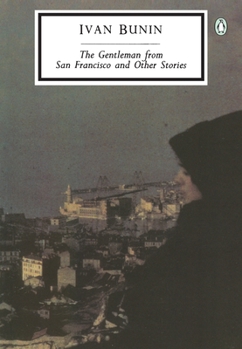The Gentleman from San Francisco and Other Stories
Select Format
Select Condition 
Book Overview
Powerful, evocative stories from the first Russian author to win the Nobel Prize in Literature A Penguin Classic A much neglected literary figure, Ivan Bunin is one of Russia's major writers and ranks with Tolstoy and Chekhov at the forefront of the Russian Realists. Drawing artistic inspiration from his personal experience, these stories are set in the late nineteenth- and early twentieth-century Russia of his youth, in the countries...
Format:Paperback
Language:English
ISBN:0140185526
ISBN13:9780140185522
Release Date:September 1992
Publisher:Penguin Publishing Group
Length:224 Pages
Weight:0.45 lbs.
Dimensions:0.5" x 5.3" x 7.9"
Related Subjects
Anthologies Classics Fiction History Literature & Fiction Short Stories World LiteratureCustomer Reviews
5 ratings
The ecstasy of being alive
Published by Thriftbooks.com User , 15 years ago
Ivan Bunin's one major message is Horace's Carpe Diem. You should `enjoy your life, because you're earlier dead than you think.' `Even today people still marvel above all else at death and refuse to accept it.' One of the characters in this book expresses it also as follows: `I'm suffering from a fatal disease. And I assure you that I go on living as if there were nothing the matter.' (`At Sea, at Night') How should you enjoy yourself? By the prime of love (`Late Hour'), and one of its ingredients, sex: `When you love someone no power on earth can make you believe that you may not be loved in return.' But this love can also be violent (`The Riverside Tavern'). Sex is enjoyed in furtive encounters with `the shamelessness of the purest innocence' (`Zoyka and Valeria'), lonely women on a journey (`Sunstroke', `Visiting Cards') or plain adultery (`The Caucasus'). Ivan Bunin's eroticism is outspoken. He enjoys all parts of the female body. Those who cannot enjoy life, those who don't master the art of love, those who cannot accept that love sometimes dies (`Mitya's Love'), those who cannot overcome the death of a loved one and those who go to war (`A cold Mountain'), are doomed. Also doomed are the `Modern Men' with their stupid arrogance, like `The Gentleman of San Francisco', who forgot to live. The longest story in this bundle is `Mitya's Love', Bunin's version of Goethe's Werther combined with elements of Tolstoy's `The Devil'. Mitya is Bunin's anti-hero because he cannot overcome an unanswered love. However, the story is not totally convincing. It is too long and the introduction of the sexual element is rather forced. This book is a very worthwhile read.
no title
Published by Thriftbooks.com User , 19 years ago
No wonder he won the Nobel Prize! Four hauntingly magnificent short stories, all but the third with death as the end. Or maybe not the end, but the raison d'etre of the story. "The Gentleman from San Francisco" almost half the book, translated rather badly, I suspect, in the version I read, by D. H. Lawrence; "Gentle Breathing", an incredibly subtle story; "Kasimir Stanislavatch", and "Son". In each, he takes the human tragedy and contrasts it with beautiful nature. His detail is remarkable. The stories are all short, plots not intricate or even eventful, but he manages to make each one simply live and breathe and have being. It rather reminds me of all Russian writers; they're all so tragic. What is it about being a Russian? And nobody remembers him as they do Chekhov, or Tolstoy. I wonder why. Perhaps his volume of writing was not large enough.
The Capacity to Feel with a Singular Intensity
Published by Thriftbooks.com User , 19 years ago
In the meditation entitled "Night," Bunin's unnamed narrator says: "Why did God choose to brand me so deeply with wonderment, thought and `wisdom', and why is that fatal mark constantly growing inside me?" Although the voice is abstract, I think it works as a description of Bunin himself. He wasbclearly a man with (again in his own words) "the capacity to feel with a singular intensity ... not only their own identities but those of other people...." And although he may feel that his capacity is somehow unusual, he does a remarkable job of imagining (or is it projection?) that capacity in others. Everybody, he says somewhere (although I can't put my finger on it), has a story that deserves to be told. In his introduction, David Richards calls Bunin "egocentric." In context I think I know what it means, but it's an odd choice of words and I suspect misleading. Conceded that Bunin is not a "social" novelist in the sense that Tolstoi is, nor a dramatist like Dostoevsky: his metier is, indeed, the minute attention to feelings. In some sense I suppose these feelings are "his own," but in some sense, every artist's feelings are "his own." Perhaps closer to the mark to suggest that at some level every one of us is an egocentric, and that Bunin may be able to capture the egocentricity in all of us. Caution: Bunin won a Nobel Prize, but don't be misled into disappointment. He's a fine and rewarding writer, but not better than several others who did not win the prize, the award of which inevitably has more to do with politics than with intrinsic merit.
Great stories
Published by Thriftbooks.com User , 19 years ago
Ivan Bunin is a great writer. And as for the readers, reading his stories and enjoying them are a mark of achievement. As you read his stories fierce chill pierces through you simultaneously as grand pictures fill your imaginations.
Amazing short stories
Published by Thriftbooks.com User , 24 years ago
Bunin is one of the most brilliant Russian writers of the early 20th century. His short stories express more in a couple of pages than most novels do in hundreds. It is poetry in prose.






